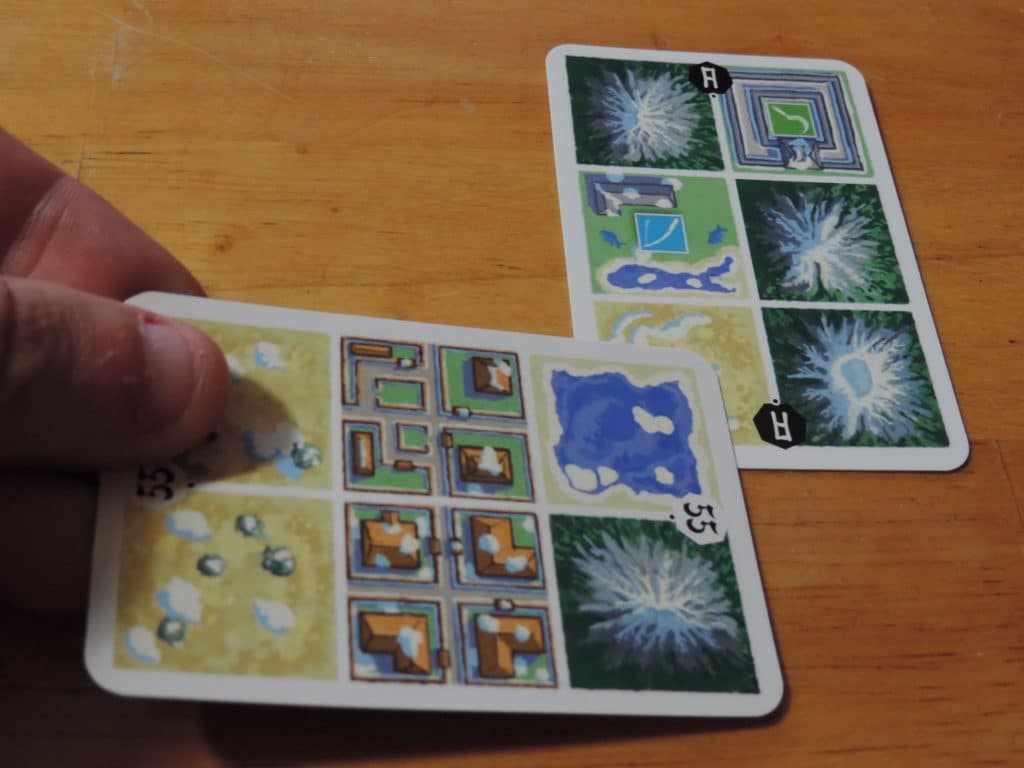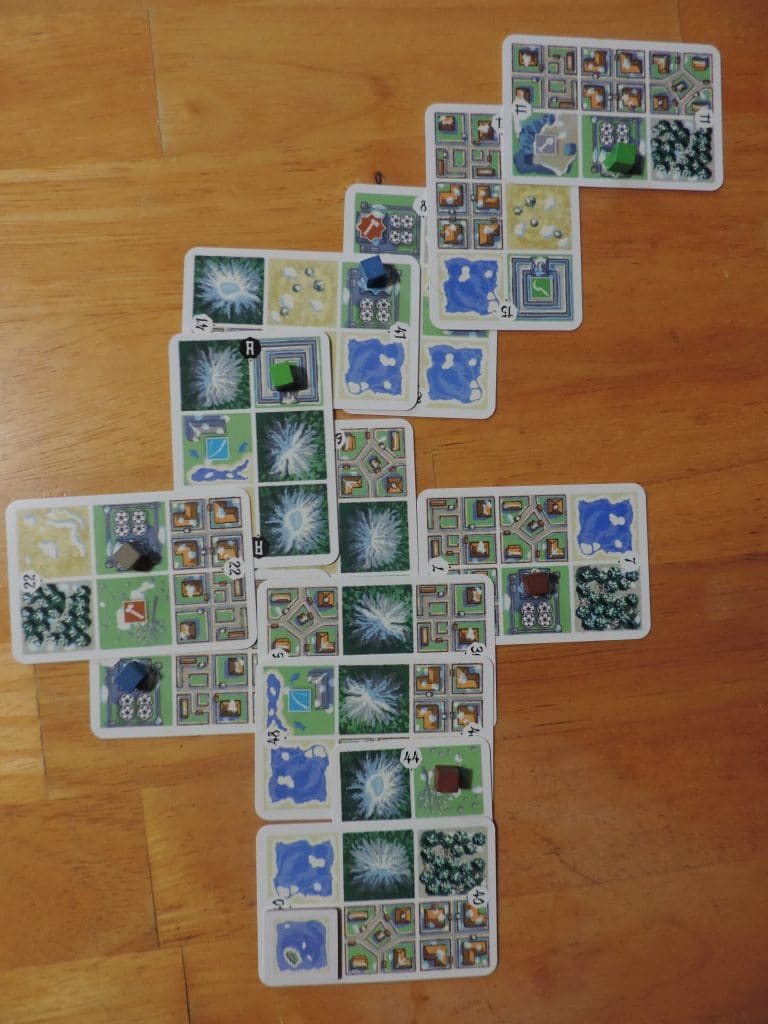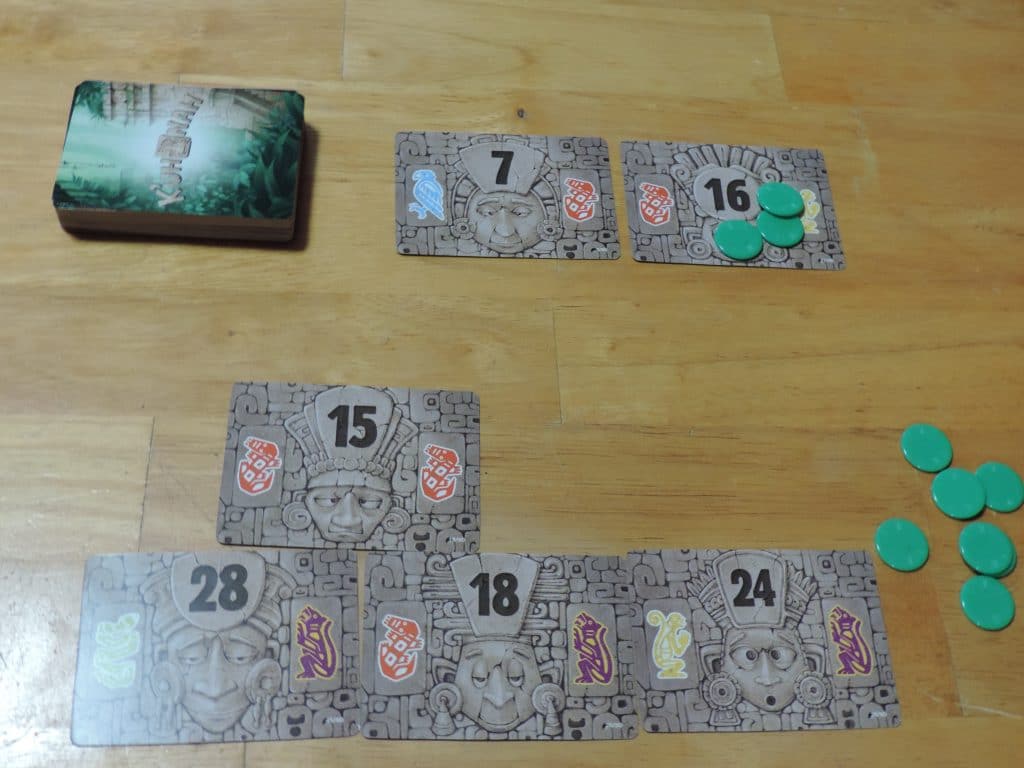Today I want to take a quick look at two small box board games.
In one, you’ll layout a city. In the other, you’ll build a pyramid. In one, you’ll want the highest score. In the other, you’ll want the lowest. In one, you’ll draft cards. In the other, it’s the luck of the draw.
Introducing Hokkaidō and K’uh Nah
Both games play fast; 20 minutes tops. So their size, simplicity, and speed of play make both games decent pack-and-play options or game night fillers after you’ve taxed your brainpan with heavier games.
Hokkaidō
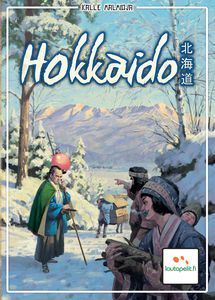
Hokkaidō from Renegade Games progresses through a series of 12 card drafts. Drafted cards are arranged in front of each player to create a unique regional map of Japan that features mountains, forests, factories, lakes, and towns–all of which are worth varying victory points (VP) at game end depending on their arrangement.
You place your newly drafted cards down so that at least one square of the new card overlaps or lies behind another. Plus, some squares will also generate resources that can be used to terraform desert squares into other types.
Pick your card; pass the rest. Place your drafted card; terraform if desired, repeat. Rinse and repeat 12 times. Highest score wins!
Incidentally, Hokkaidō is the second game in a series…sort of. The first, Honshu, looks and plays nearly exactly like Hokkaidō with the difference being that Honshu has a trick taking element, whereas Hokkaidō opts for the card drafting mechanic. So, if you have Honshu, I don’t imagine you’d need or want Hokkaidō. It isn’t a sequel so much as it swaps one mechanic for the other.
![]()
Covering a desert square is always a good play. They’re worth 0 points. 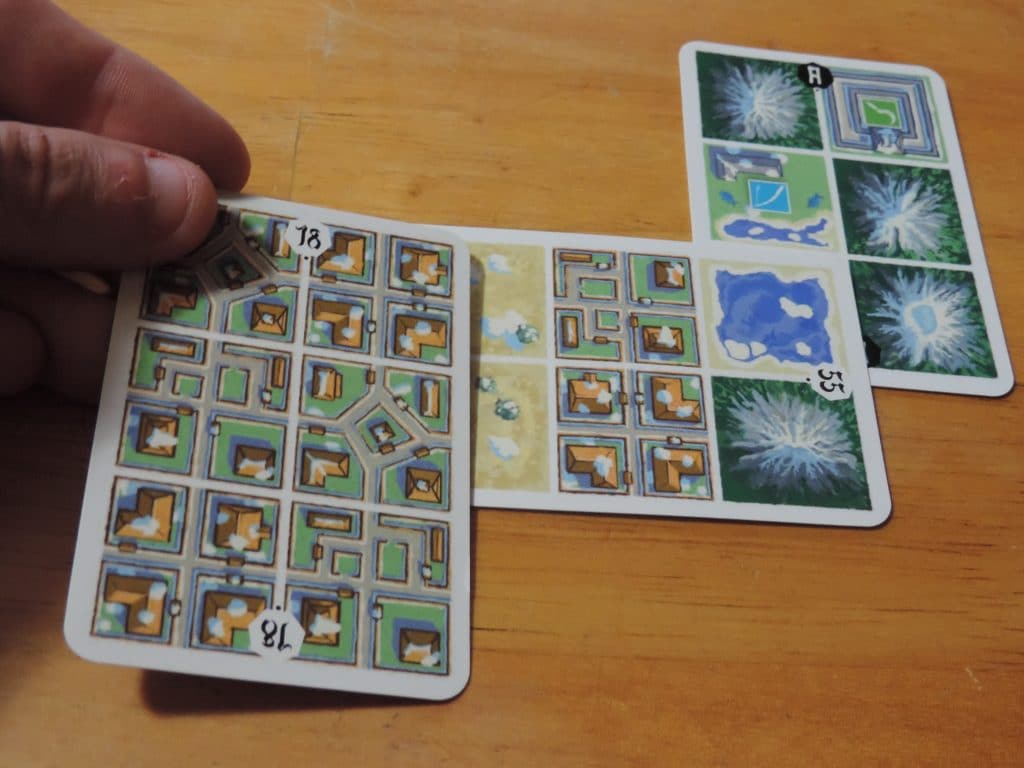
And now to take care of the two desert squares I added! ![]()
A finished city! 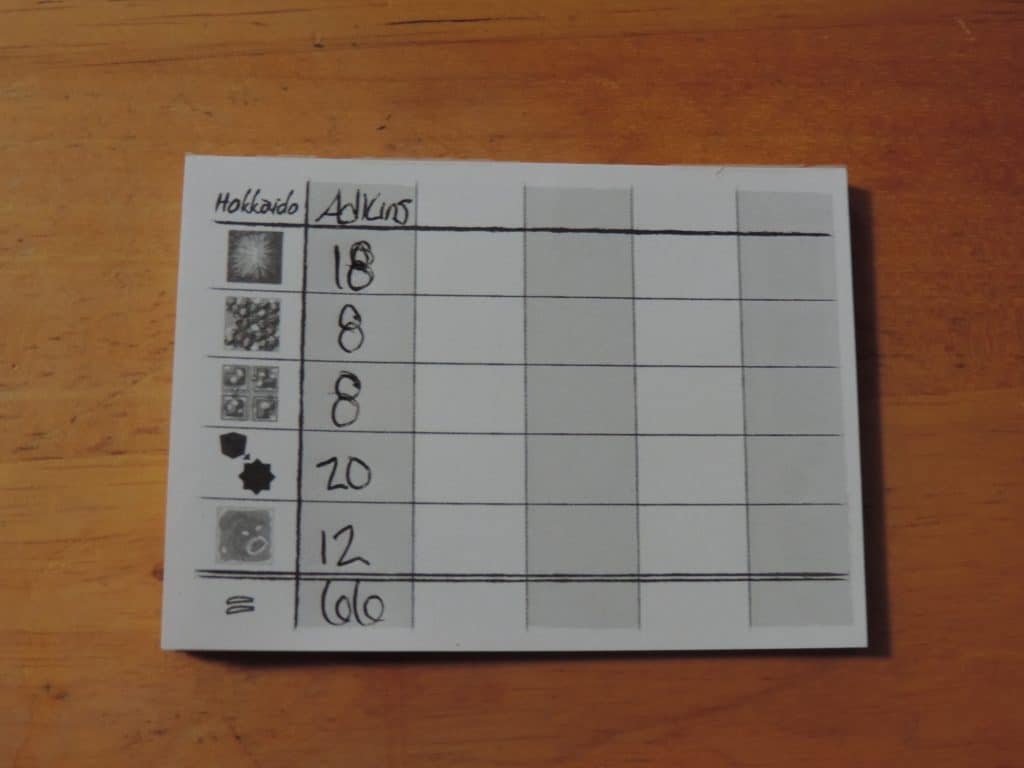
Not a bad score (I think!)
K’uh Nah
K’uh Nah from WizKids feels quite a bit more luck-based, but it does have some balancing elements that provide some appreciable strategy.
A deck of cards is shuffled and the top two are revealed to form the “Quarry.” Players take turns placing one of their eight starting Jade tokens on a card in the Quarry or claiming a card for themselves in order to construct their pyramid.
Most of the time your play will be obvious. The challenge comes when you’re faced with the choice between laying down some Jade or picking up a less than ideal card! Because here’s the thing: if you pass too many times and run out of Jade, you have to take a card on each of your turns.
The cards have values from 6-30 along with symbols. These two features determine whether and when you pass or claim any given card since blocks in your pyramid can only be supported by blocks of a higher value or when symbols match in a certain way. The value of any blocks that are not supporting any others are totaled together, and you subtract one from that score per Jade remaining in your possession. Lowest score wins.
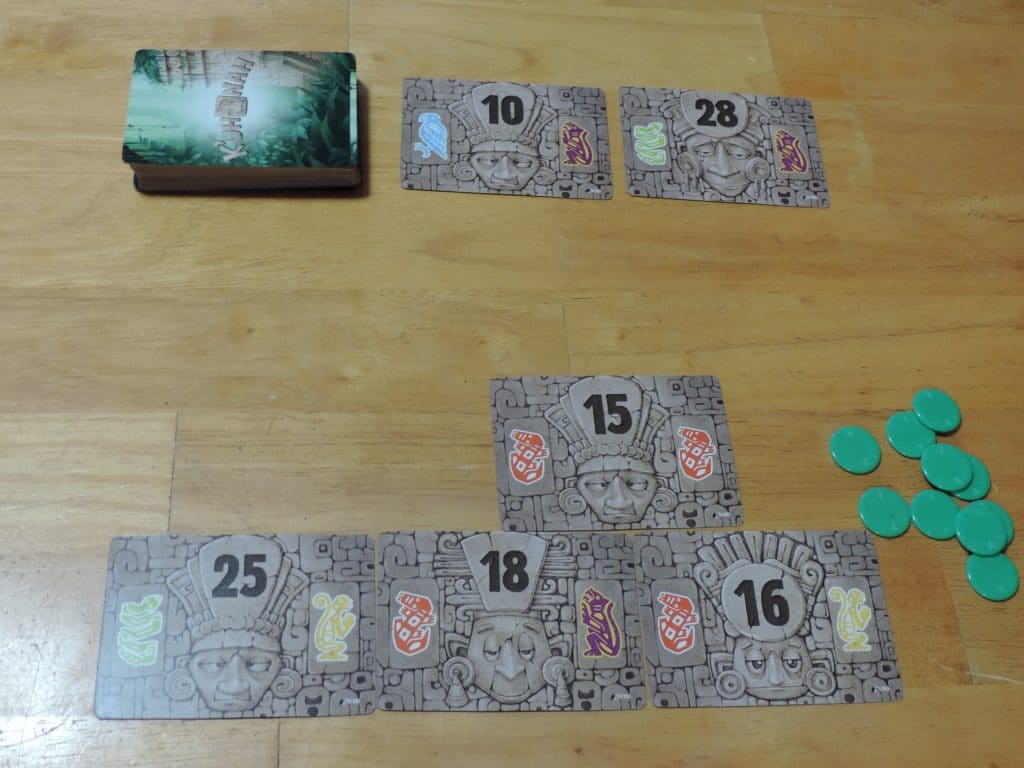
Lots of options here. ![]()
That 16 isn’t great, but it sure beats an exposed 24 AND it comes with Jade! 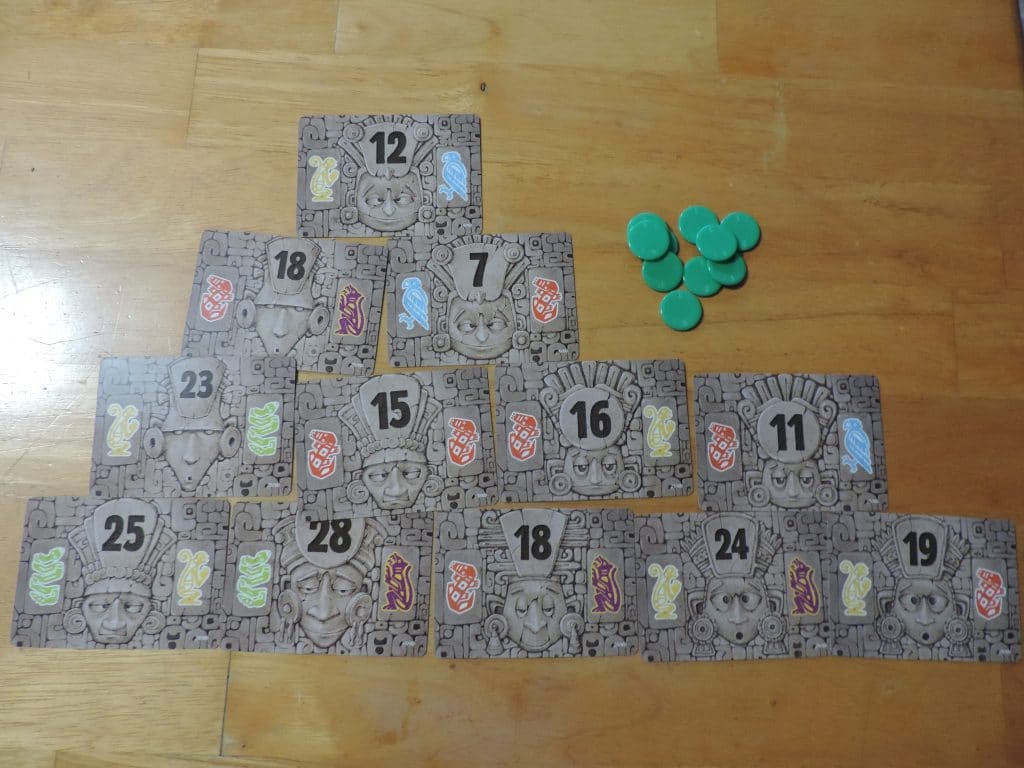
A finished pyramid. Score = 12+11-10 = 13.
HOKKAIDŌ AND K’UH NAH: Worthy Additions?
We’re not exactly comparing apples to apples here given the gameplay differences, but does one game outshine the other?
Hokkaidō has a few more fiddly bits with the resource cubes and terraforming option. I also think there is a lot more forced strategy to it than K’uh Nah. By this I mean you have to place your drafted card every turn, whereas K’uh Nah‘s Jade mechanic allows you to possibly bypass laying cards down. You don’t sit around and hope for the best in Hokkaidō as you will in K’uh Nah; you deal with what you’re dealt hand to hand.
That said, K’uh Nah‘s simplicity may give it an edge. When we played Hokkaidō, not one of us terraformed. The factory option is typically a much better bet, so terraforming seemed largely unattractive. But with K’uh Nah, all of us fretted over our Jade.
We zipped right through Hakkaidō in probably 10 minutes, but the press-your-luck element of K’uh Nah had us performing cost-benefit analyses with every turn! So we ended up favoring it a bit, which goes against the grain of their Board Game Geek (BGG) ratings.
The Value of Small Box Games
Your milage may vary, of course, and you probably have preferences when it comes to gameplay mechanics and styles! Both games are less than $20 on Amazon, and your collection isn’t going to suffer for both!
Get Hakkaidō here. | Get K’uh Nah here.
Indeed, small box games are great additions to any gaming collection as they tend to be simple (as these are) and accessible (as these are) to anyone, regardless of their tabletop gaming experience.
Nerds on Earth has been doing a series of articles that begin with simple games only to walk you through more complex games. (Terraforming Mars or Pandemic for example.) To that end, each of today’s games would serve as nice introductions to a few mechanics that play large roles in much more complex games. There is value in that.


